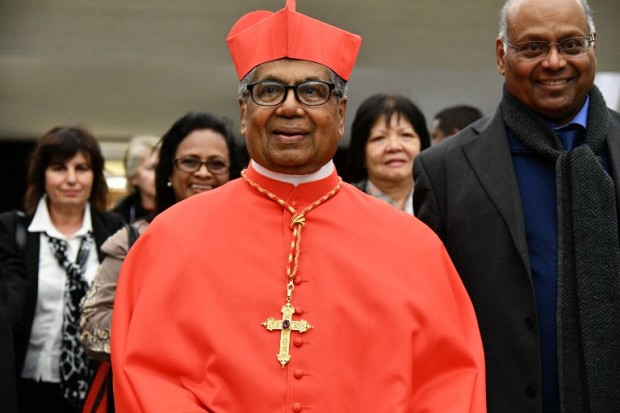Pope creates 17 cardinals, ‘Princes of the Church’

Newly elevated cardinal, archbishop of Kuala Lumpur in Malaysia, Anthony Soter Fernandez, arrives for a courtesy visit with relatives following a consistory on November 19, 2016, at the Paul VI audience hall in Vatican. Pope Francis created 17 new cardinals from across the globe Saturday, elevating them in a time-honored ceremony to an elite body that advises and elects popes. Three of them are from the US, while others come from corners of the world where the Catholic Church needs a boost.
AFP
VATICAN CITY, Holy See — Pope Francis created 17 new cardinals from across the globe on Saturday, elevating them in a time-honored ceremony to an elite body that advises and elects popes.
Three of them are from the US, while others come from corners of the world where the Catholic Church needs a boost.
Dressed in red robes, the “princes of the Church” knelt before the pontiff to pledge their allegiance in a solemn ceremony.
Thirteen of them are under 80 and therefore eligible to take part in the next secret conclave to elect or become the head of the world’s 1.2 billion Catholics. They are known as cardinal electors.
History’s first Latin American pope is famed for wanting to reach out to far-flung dioceses often overlooked by Rome and he has largely shunned European candidates, favoring low-key, pastoral figures or men he knows.
Article continues after this advertisementThe cardinal electors come from Bangladesh, Belgium, Brazil, Central African Republic, Italy, Mauritius, Mexico, Papua New Guinea, Spain, the United States and Venezuela.
Article continues after this advertisementFrancis warned them against falling victim to a “growing animosity” between people, including within the Church, in a possible reference to divisions within the hierarchy over the pope’s bid for a more open, forgiving Church.
He also urged them to fight growing xenophobia in the world and protect those such as refugees, who are often classed as enemies.
‘Our greatest wealth’
“How many situations of uncertainty and suffering are sown by this growing animosity between peoples, between us! Yes, between us, within our communities, our priests, our meetings,” he said.
“We come from distant lands; we have different traditions, skin color, languages and social backgrounds; we think differently and we celebrate our faith in a variety of rites. None of this makes us enemies; instead, it is one of our greatest riches,” he said.
The pope gave each man a three-cornered red hat, telling them that the color symbolizes “your readiness to act with courage, even to the shedding of your blood” for the Catholic Church.
They were also handed a gold ring of their high office.
Newly created Cardinal Blase Cupich of Chicago said he and the others were ready to act on the pope’s words.
“It’s getting out of hand in society today, where people almost have this contagious inflammation of animosity towards each other because they’re different, they speak different languages, they look different. Are we going to be swept up in this violence?
“We’re going to reach out to those we disagree with, we’re going to love our enemies,” he told AFPTV.
Cardinal Sergio da Rocha from Brazil echoed his words, saying: “We cardinals have to contribute… to make sure there is respect and dialogue everywhere, both in the Church and in the world.”
After the ceremony, the new cardinals visited retired pope Benedict XVI at his home inside the Vatican.
Honorary ‘red hats’
The unexpected pick of three Americans reverses a trend that saw Francis pass over US candidates in his first two consistories.
The youngest of the new cardinals is 49-year old Dieudonne Nzapalainga, the archbishop of Bangui, who organized the pope’s 2015 visit to Central African Republic, where Francis opened the first “Holy Door” outside of Rome.
Some come from areas where Catholics are a distinct minority: Patrick D’Rozario is from Bangladesh where Christians represent just 0.03 percent of the total population, and only fifty percent of those are Catholics.
The sole Italian cardinal-elect is Mario Zenari, who is currently the papal envoy to Syria.
Among the four “red hats” over 80, who are given the title for service to the Church, is Albanian priest Ernest Simoni, who reduced Francis to tears in 2014 when he recounted the two decades he spent imprisoned for his faith during Albania’s brutal communist rule.
Another of the over 80s, Sebastian Khoarai from Lesotho, was not present because of ill health.
Francis has now named 44 cardinal electors, just over a third of the total of 120 allowed by Church law. CBB/rga